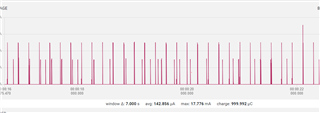I'm trying to set up a project with SDK 16.0.0 using FreeRTOS with the softdevice. The device will be battery powered and therefore power management capabilities are required.
My freeRTOSConfig.h is the same as in the ble_app_hrs_freertos_pca10040_s132 with the following additions:
#if ( __FPU_PRESENT)
#define PWR_MGMT_FPU_SLEEP_PREPARE() pwr_mgmt_fpu_sleep_prepare()
extern void pwr_mgmt_fpu_sleep_prepare(void);
#else
#define PWR_MGMT_FPU_SLEEP_PREPARE()
#endif // NRF_PWR_MGMT_CONFIG_FPU_SUPPORT_ENABLED
#define configPRE_SLEEP_PROCESSING(x) PWR_MGMT_FPU_SLEEP_PREPARE()
#define configSUPPORT_STATIC_ALLOCATION
Based on this thread I tried to add pwr_mgmt_fpu_sleep_prepare in main.c, however my code gets a busfault any time I use the __get_FPSCR() or __set_FPSCR() macro.
My application works as expected except not sleeping when I comment out the FPSCR macros.
When I uncomment the macro's the busfault breakpoint triggers and the PC is stopped at address 0xA60.
Do I need to implement this sleep prepare step?
Why do these FPSCR macro's cause a bus fault?
Given:
1) I'm not even using the FPU.
2) This example only performs some I2C operations once per second
3) I have RTC2 enabled and operating at 32KHz with only overflow interrupt enabled ( for tracking time independent from freeRTOS )
4) I have an idle task hook that does NRF_LOG_FLUSH with NRF_LOG_ENABLED
Then will it be reasonable to expect the sd_app_evt_wait() call to sleep for some amount of time? It seems at the moment it will never sleep despite every task being blocked/suspended.


